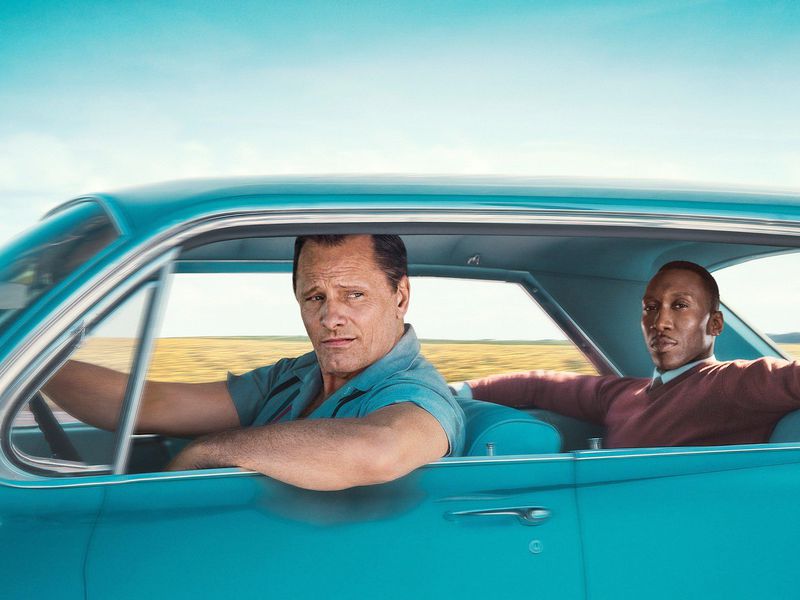Dialogue 1
Jingjing: So, Mark, have you seen any good movies lately?
京晶:那么,马克,最近看什么好电影了吗?
Mark: It's funny you should ask. The day before yesterday I saw a movie at the cinema. It was the first time in over a year I dragged myself out there to catch a flick.
马克:你这么问挺有趣的。前天我就在影院看了部电影。这是一年多以来我第一次让自己亲自走进电影院看电影。
Jingjing: Ok, good for you. What'd you see?
京晶:噢,那真不错。你看了什么?
Mark: It was called The Green Book. Have you seen it yet?
马克:这部叫《绿皮书》。你看了吗?
Jingjing: I haven't; but I've been hearing a lot about it. It won best picture, didn't it?
京晶:还没,但关于它我已经听说了不少。它获得了(奥斯卡)最佳影片,对吧?
Mark: Yeah. I listened to an interview with the director on the radio. After it won, I thought I'd better see it while it's still in theaters.
马克:是的,我听了电台对导演的采访。获奖之后,我想我最好赶在影院上映期间把它看了。
Jingjing: Is it better to see in the cinema?
京晶:在影院观看更好吗?
Mark: Of course, but it's still a good movie for small screens.
马克:那当然,但它也仍是一部适合小屏幕观看的好电影。
Jingjing: Well, I'll add it to my list. Can you give me the rundown without spoiling the plot?
京晶:这么一说,我要把它加入我的观影单了。你能在不剧透情节的前提下给我大致概述下吗?
Mark: I'll try. There's an Italian American guy who gets a job driving an African American guy on a concert tour through the states in the south east.
马克:我试试。有一个意大利裔美国人,找了一份工作,开车带一个非洲裔美国人到美国东南部开巡回演奏会。
Jingjing: Wait a sec—why does their race matter.
京晶:等一下,为什么他们的种族这么重要?
Mark: Oh, well it's a period film, and takes place in the 50s or 60s when Jim Crow laws are still in effect.
马克:哦,它是一部年代电影,发生在吉姆·克劳法生效的五六十年代。
Jingjing: Weren't those laws about which schools and public wash rooms people could use, depending on their race?
京晶:这不是关于依种族决定人们可以使用哪些学校和公共洗手间的法律吗?
Mark: You got it. America was pretty segregated, especially in south-eastern states until the Civil Rights movement in the late 1960s. And this story takes place just before that.
马克:正是。在20世纪60年代末民权运动之前,美国是相当隔离的,特别是在东南部各州。而这个故事就发生在那之前。
Jingjing: Hmm, I heard it was based on a true story. Was it?
京晶:嗯,我听说这是基于一个真实的故事,是吗?
Mark: It's believable. And I bet African American musicians like the main character went on tour with private drivers. That's true to life, and a great premise for a movie.
马克:这是可信的。并且我敢打赌像主角这样的非裔美国音乐家和私人司机一起巡回演出,在生活中是真实的,也是电影的一个重要前提。
Jingjing: Now I really want to go see it.
京晶:现在我真想去看看。
New words : 习语短语
flick (informal) 电影
movie, film (because of the flicker of a movie projector)
a period film 年代电影
a story that takes place in a time long before the film was made
Jim Crow laws 吉姆克劳法
laws that didn't let African Americans go to the same schools or use the same public places as whites
吉姆·克劳法 (Jim Crow laws) 泛指1876年至1965年间美国南部各州以及边境各州对有色人种(主要针对非洲裔美国人,但同时也包含其他族群)实行种族隔离制度的法律。这些法律上的种族隔离强制公共设施必须依照种族的不同而隔离使用,且在隔离但平等的原则下,种族隔离被解释为不违反宪法保障的同等保护权,因此得以持续存在。但事实上黑人所能享有的部份与白人相较往往是较差的,而这样的差别待遇也造成了黑人长久以来处于经济、教育及社会上较为弱势的地位。
segregated 隔离
separated places of living and work
the Civil Rights movement 民权运动
premise 前提,假定
the idea for a story, characters and what they will have to do
Dialogue 2
Mark: Hurry up, or you'll miss it in the theaters.
马克:快点,不然你将错过上映时间。
Jingjing: Why do you think it won best picture?
京晶:你觉得它为什么会获得最佳影片?
Mark: Well, I don't know much about the other nominees. The Green Book did an excellent job showing what racial tensions were like 60 years ago.
马克:嗯,我对其他提名者不太了解。绿皮书出色地展示了60年前的种族紧张状况。
Jingjing: If someone has never been to America, would they understand the film?
京晶:如果有人从未去过美国,他们会理解这部电影吗?
Mark: Definitely. That's why I think they made the film well. They show the difference between life in the north and life in the deep south.
马克:当然。这就是为什么我认为他们拍的很好。他们展示了北方地区和南方腹地生活的差异。
Jingjing: Did you see it with your wife?
京晶:你和你太太一起看的吗?
Mark: Yeah. She hasn't been to the U.S. yet, and she was asking me if it's still like that now.
马克:是的,她还没有去过美国,并且他问我现在的情况是否还这样。
Jingjing: And, what'd you answer?
京晶:你怎么回答的?
Mark: There's still racial tension. I'm reminded of what Condeleeza Rice said about slavery, how it was a birth defect for America.
马克:种族关系仍然紧张。我想起了康得利·莱斯关于奴隶制的说法,它是如何成为美国的先天缺陷。
Jingjing: Wow, yeah, it's hard to fix something like that. What about racial tensions nowadays?
京晶:哇,是的,那个解决起来可不是一件容易事。现在的种族紧张局势怎么样?
Mark: They definitely still exist. I remember going to a party with Cubans. This was in the States but I was the only one there who was not from Cuba. Black guys and white guys got along like there was no difference whatsoever. It surprised me, and made me think about tension between different kinds of people.
马克:它们肯定还存在。我记得我和古巴人去参加一个聚会。当时是在美国,但我是唯一一个不是来自古巴的人,黑人和白人相处的好像也没有什么不同。这让我很惊讶,开始让我思考不同的人之间存在的紧张关系。
Jingjing: You just have to make sure your group of friends is diverse, right?
京晶:你只需确保你的朋友群体是多元化的,对吧?
Mark: Yeah, I think so.
马克:是的,我想是的。
Jingjing: It's up to each person to fix the tension they feel with different people, if there is any tension, that is.
京晶:这取决于每个人如何处理和克服面对不同的人时所感受到的紧张,如果有的话。
Mark: Right. Anyway, I'm glad The Green Book was made. It was a very good movie.
马克:对,不管怎样,我很高兴有了“绿皮书”这部电影。真是一部非常棒的电影。
Jingjing: I'm curious about it now.
京晶:我现在非常好奇了。
New words : 习语短语
racial tensions 种族紧张关系
bad feelings toward one another, because people are not the same race
Condeleeza Rice
born in Birmingham, Alabama, Secretary of State 2005-2009, now a professor of political science at Stanford
生于阿拉巴马州伯明翰,2005-2009年国务卿,现任斯坦福大学政治学教授
slavery 奴隶制
the period in American history when whites owned black workers, didn't pay them or let them travel freely
birth defect 先天缺陷
a problem someone has when they are born, hard to fix, might cause a person to have problems all their lif
diverse 多元化,各种各样的
many different races of people together












